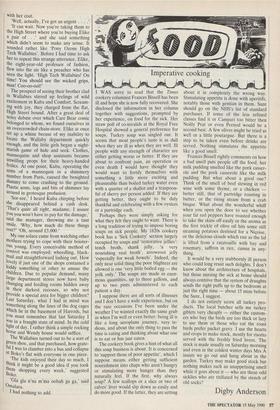Imperative cooking
11.61410741011Mt ..).1441rnWeal"Ljt' 11111_, I WAS sorry to read that the Times cookery columnist Frances Bissell has been ill and hope she is now fully recovered. She disclosed the information in her column together with suggestions, prompted by her experience, on food for the sick. Her straw poll of co-invalids at the Royal Free Hospital showed a general preference for soups. Turkey soup was singled out. It seems that most people's taste is as dull when they are ill as when they are well. Ill people with any strength of character are either getting worse or better. If they are about to confront pain, an operation or even death I would have thought they would want to fortify themselves with something a little more exciting and pleasurable than boiled turkey water even with a quarter of a shallot and a teaspoon- ful of sherry per person added. If they are getting better, they ought to be duly thankful and celebrating with a few oysters or a partridge each. Perhaps they were simply asking for what they felt they ought to want. There is a long tradition of trying to impose boring soups on sick people. My 1820s cookery book has a 'Sick Cookery' section largely occupied by soups and 'restorative jellies': tench broth, shank jelly, 'a very nourishing veal broth', arrowroot jelly `especially for weak bowels'. Indeed, the only near solid thing the poor blighters are allowed is one 'very little boiled egg — the yolk only.' The soups are made in enor- mous quantities, up to three gallons, and up to two pints administered to each patient a day. I suppose there are all sorts of illnesses and I don't have a wide experience, but on the rare occasions I've been under the weather I've wanted exactly the same grub as when I'm well or even better: being ill is like a long aeroplane journey, very te- dious, and about the only thing to pass the time is eating and thinking about what one is to eat or has just eaten.
The cookery book gives a hint of what all this soup business is about. It is concerned to 'support those of poor appetite', which I suppose means either getting sufficient nourishment into chaps who aren't hungry or stimulating more hunger than they naturally feel. If the first, why always soup? A few scallops or a slice or two of calves' liver would slip down as easily and do more good. If the latter, they are setting about it in completely the wrong way. Stimulating appetite is done with aperitifs, notably those with gentian in them. Suze should go on the NHS's list of standard purchases. If some of the less refined classes find it or Campari too bitter then Noilly Prat or even Pernod would be a second best. A few olives might be tried as well or a little poutargue. But there is a step to be taken even before drinks are served. Nothing stimulates the appetite like a good smell.
Frances Bissell rightly comments on how a bad smell puts people off the food, her milk pudding smelled like the pork casser- ole and the pork casserole like the milk pudding. But what about a good one?
Think of the smell of beef stewing in red wine with some thyme, or a chicken better still, that of partridge roasting in butter, or the rising steam from a crab bisque. What about the wonderful whiff when you open the door to see whether your fat red peppers have roasted enough to take the skins off easily or the aroma as the first trickle of olive oil hits some still steaming potatoes destined for a Nicoise, or the delicious clouds which rise as the lid is lifted from a ratatouille with bay and rosemary, saffron in rice, cumin in any- thing.
It would be a very stubbornly ill person who could long resist such delights. I don't know about the architecture of hospitals, but those nursing the sick at home should always contrive that the system of draughts sends the right puffs up to the bedroom at just the right time — about 15 mins before the Suze, I suggest.
I do not entirely scorn all turkey pro- ducts. The local butcher sells me turkey giblets very cheaply — either the custom- ers who buy the birds are too thick or lazy to use them or those who eat the roast birds prefer packet gravy. I use the hearts and crops to make stock, mostly for risotto served with the freshly fried livers. The stock is made usually on Saturday morning and even in the coldest winter days Mrs A insists we go out and hang about in the garden. Turkey may make good stock but nothing makes such an unappetising smell while it goes about it — who are these odd sicklies who are titillated by the stench of old socks?
Digby Anderson


































































 Previous page
Previous page